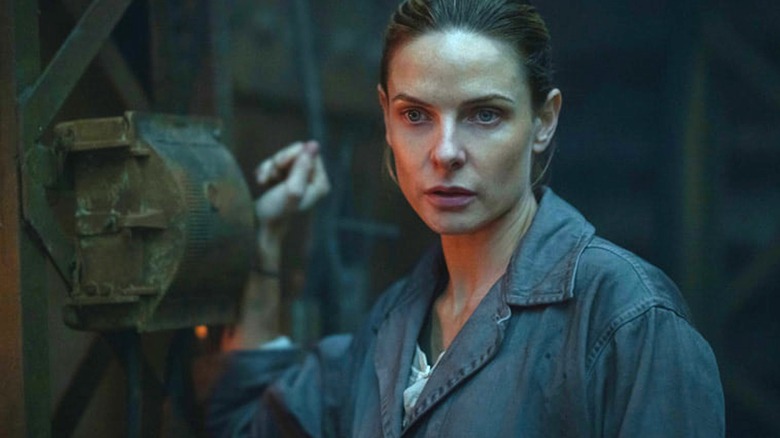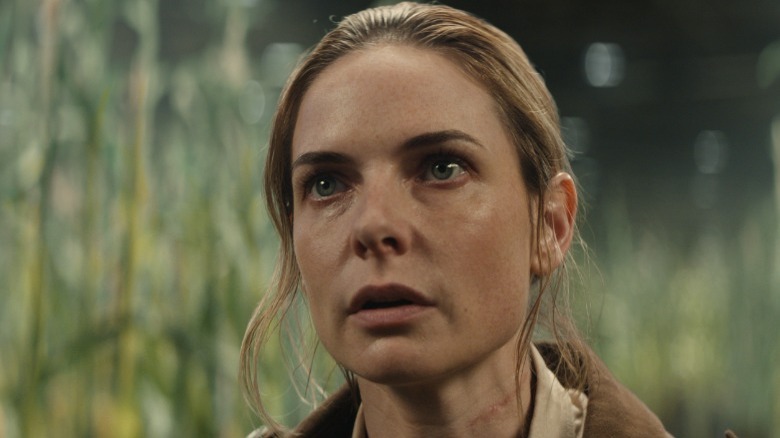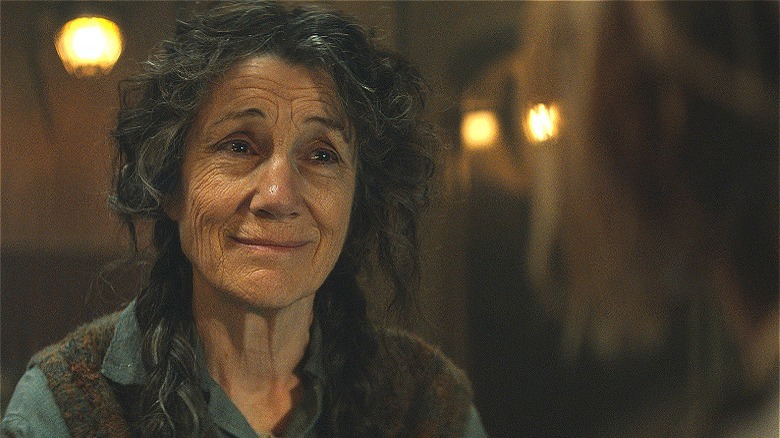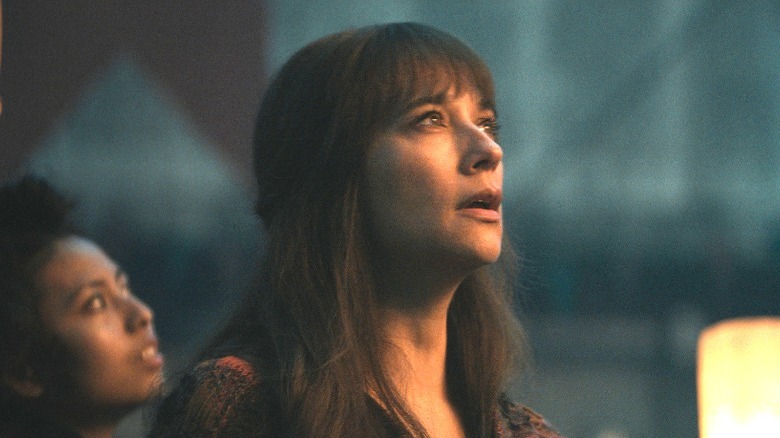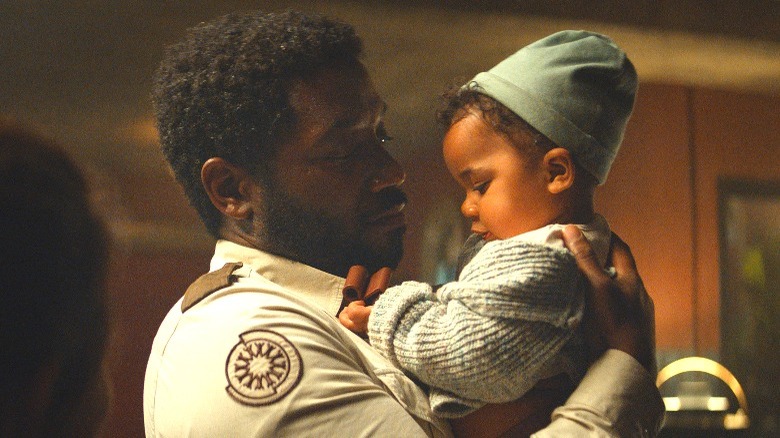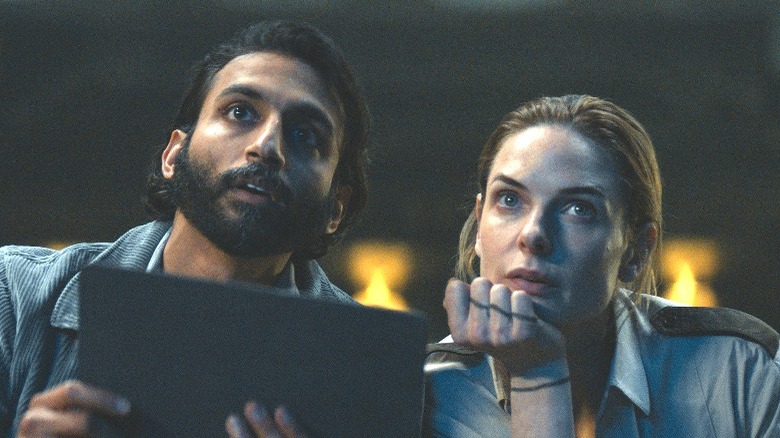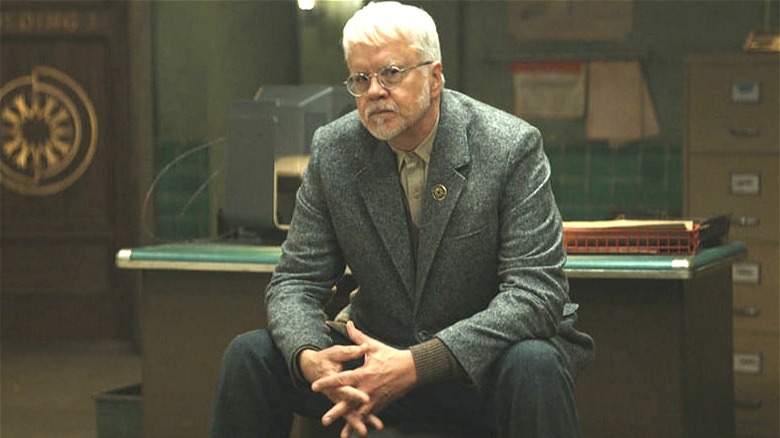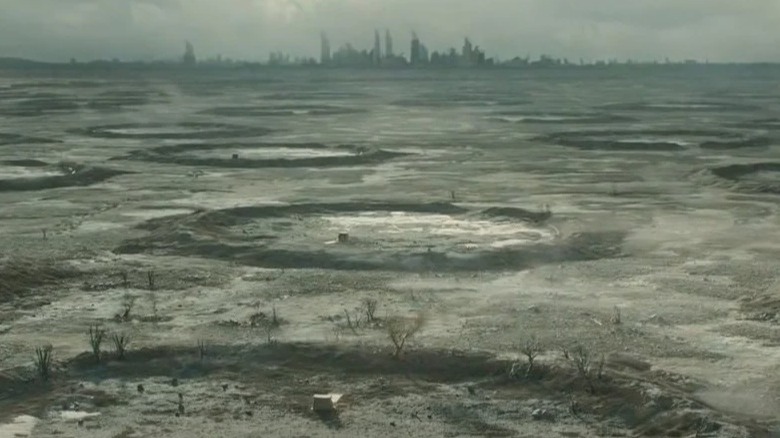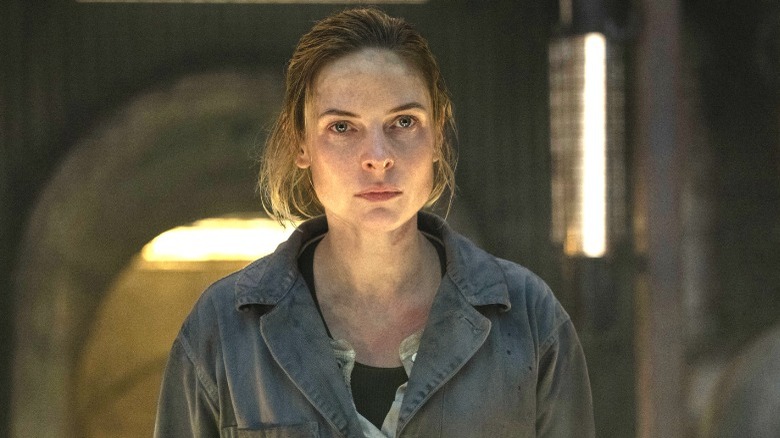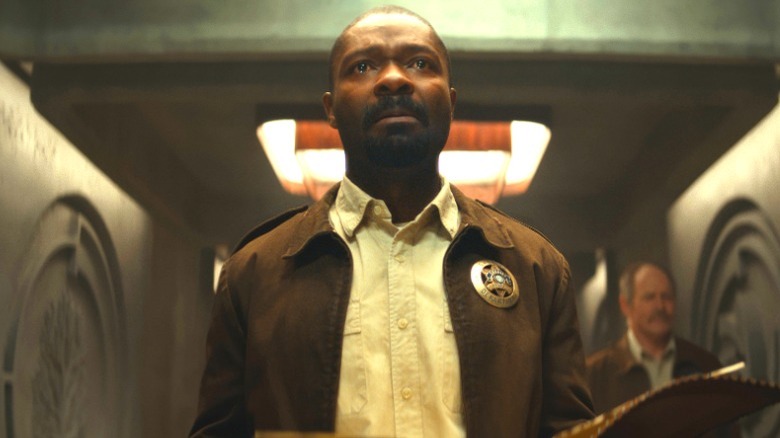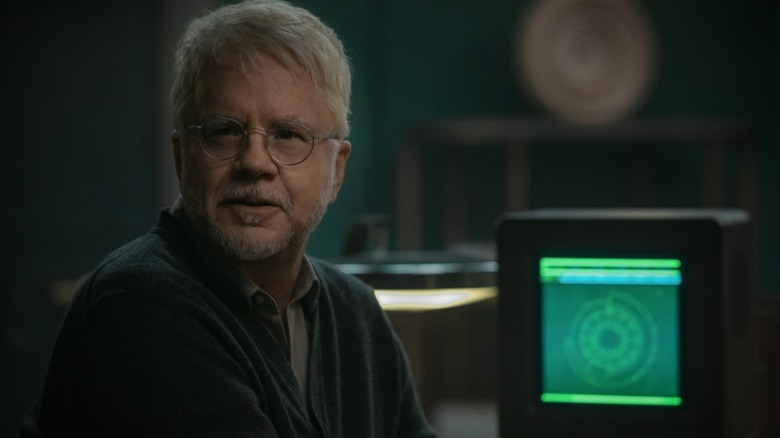The Ending Of Silo Season 1 Explained
Contains spoilers for "Silo"
Initially self-published as a short ebook of only 60 pages, Hugh Howey's "Wool" was the first in a series of books about a post-apocalyptic, dystopian society that forces humanity underground in the wake of an indeterminate disaster. Told through a series of novellas and short stories surrounding the lives of Silo inhabitants, it imagines a world in which human history has been either erased or forgotten, along with the knowledge of why the air above is so toxic that anyone who breathes it dies within a matter of minutes. Among the many rules governing the lives of those below, the most fundamental is that anyone who says they want to go outside will be condemned to this fate, referred to as "cleaning," because they're required to wash off the sensors so that those inside can continue to see the hell awaiting anyone who wishes to follow. And yet despite these horrors, everyone who goes outside inexplicably takes the time to clean before dying.
Deftly handling the Silo's many characters and stories, Apple TV+'s television adaptation of "Wool" offers a haunting vision of life in the Silo. With a detailed set that's reminiscent of "Fallout IV" and an outstanding cast that includes Rashida Jones, Rebecca Ferguson, and Tim Robbins, "Silo" represents some of the best science fiction streaming today. From relics to secret camps to even more secret surveillance rooms, let's untangle the wool of the Season 1 finale of "Silo" to discover the truth behind the Silo.
What you need to remember about the plot of Silo
The world of "Silo" depicts a post-apocalyptic reality where 10,000 or so humans live out their lives in a mile-deep subterranean city, a 144-story silo with a large winding staircase and the only view of the world outside through a camera above ground. Silo residents are raised to understand that the world above is uninhabitable, a fact made clear by the view of the inhospitable landscape visible from the Level 1 cafeteria. They are also raised with no knowledge of their history aside from the fact that rebels burned their libraries 140 years prior to the events of "Silo." And yet paradoxically, any discovery of old books or technology must be reported to authorities immediately so they can be confiscated.
These facts combined with the community's restrictive laws and population control make existence pretty bleak for anyone cursed with a rebellious streak or simply a natural curiosity. It's an existence that comes under threat when Sheriff Holston Becker's wife Allison learns she has been intentionally kept infertile leading her to question why they are banned from accessing historical data. After helping computer guy George Wilkins discover long-lost data hidden on a hard drive that suggests everything they've been told is a lie, Allison inadvertently sets off a chain of events that leads to George's girlfriend Juliette's appointment as sheriff and the discovery that the Silo has indeed been lying to its citizens and is, in fact, only one of many.
What happened at the end of Silo?
Although initially baffled by his wife's decision to clean, a choice that leaves him grief-stricken and numb, Holston's discovery of a connection between her and Juliette's deceased lover George causes him to begin questioning, just as she did. Like Allison, he eventually becomes convinced the outside is inhabitable and declares his wish to clean. But as he does, he passes his discoveries onto Juliette by way of a message on his sheriff's badge, telling Deputy Marnes she is his chosen successor.
After initially rejecting the appointment, Juliette finally accepts the gig to search for answers to her late boyfriend's alleged death by suicide, a fact she doesn't believe possible. Through her investigation of George's death and the later deaths of Mayor Jahns and Marnes, Juliette uncovers a series of relics and clues George left behind, culminating in her discovery of the hard drive that inspired Allison to clean. After realizing that Judicial, under the direction of interim Mayor Bernard, is conspiring to keep the truth from the Silo's residents to the point of killing when necessary, Juliette works with a group of rebels to transmit the hard drive's contents into the monitor room, hopefully inciting a rebellion down the line. But because she lives in an underground silo, she can't stay hidden for long. Bernard smashes the hard drive, sending Juliette out to clean. But thanks to some fancy tape from her friend Walk, Juliette survives the cleaning, ascending from the Silo.
Silo is about perception in a post-truth world
With its subterranean civilization and technologically suppressed existence, the world of "Silo" superficially appears different from the hyperconnected, open-air world we live in today. But a closer look through the sensors reveals some eerie echoes of life in post-truth America.
The citizens of the Silo live in a world where any inquiry into their history or the nature of their existence underground is forbidden. Without access to this information, most pliantly yield to the government's draconian rules limiting technological advancement and efforts at population control. As we follow the Beckers and Juliette down the rabbit hole of questioning, it becomes clear that gaslighting is so endemic to the Silo community that its citizens have completely internalized it, something that's evident in their version of capital punishment. Per The Pact, the Silo's ultimate authority, "Any request to leave the Silo is granted, but it is irrevocable" — language that absolves Judicial of any culpability in cleaners' deaths by naming them willing participants, further emphasizing they "cannot be forced into cleaning" despite everyone understanding the contrary to be true.
In the Silo, laws, history, and even the screens through which they view the outside world are obscured, creating a world where truth is the reality everyone agrees upon rather than objective fact. For Allison, Holston, and eventually, Juliette, this mutual gaslighting becomes maddeningly intolerable, a theme that reflects our own world where whitewashing, disinformation, deep fakes, conspiracy theories, and commodified news have made even the most mundane information suspect.
It's also about the fragility of authoritarianism
LIke the generator that keeps the Silo running, maintaining control of information and imposing anti-tech laws are crucial to its operation. Without widespread access to communication or any kind of technological advancement, Silo society is frozen in time, giving authorities total control over its people. Even the architecture of the Silo lends itself to social stagnation. With no elevators allowing for swift travel between floors, moving up or down the Silo's 144 levels can be grueling and time-consuming. Combined with the compartmentalization of labor by floor, this physical distance further limits the flow of information, creating a culture where Uppers and Mids hold bigoted views of those on the lower levels, which only reinforces this sense of disconnection.
When it's revealed that the Silo is monitored from a technologically advanced control room, it becomes clear just how essential maintaining the Silo's rigid order is to the mysterious forces behind it. Holston's early warning that relics represent a "threat to order in the Silo" eventually proves prescient as contact with the hard drive unleashes an infection of doubt that ripples through the community, spreading from George to the Beckers to Juliette, and then to Walk. By the time Juliette links the library file into their network, Bernard is so desperate to shut it down that he literally yells at his staff to cover their eyes and "unsee" what they witnessed, revealing just how precarious the authority of the Silo is when threatened.
According to Rebecca Ferguson, the ending turned Silo's world upside down
After a long season spent looking into the mystery of George Wilkins' death and the white rabbit trail he left for her, Juliette finds herself in danger as Judicial closes in on her. With nowhere to go, she plays her final move by sharing her story with Walk before resigning herself to her fate as a cleaner. Moments after she does so, Walk has a lifesaving revelation when she realizes the cleaners' suits are sealed with inferior tape by design to speed up their executions, as once they leave the Silo, they are released from the law of the Pact. In an act of tremendous bravery against her agoraphobia, Walk ascends to Supply, switching the heat tape meant to seal Juliette's suit and thus saving her life, releasing her to a wider world beyond the scope of anything she had ever dreamed of.
It's a moment Rebecca Ferguson sees as a "flabbergasting" reversal, telling Entertainment Weekly "everything has been flipped upside down" going into Season 2. Comparing Juliette's revelation to a recent news story about a chimpanzee named Vanilla who was freed after 28 years locked in a cage, emerging in awe at the sky and the world around her, Ferguson called it a "really f***ing scary moment, which is also oddly exciting and new." Speaking of Season 2, which was in production before the writer's strike, Ferguson teased a darker tone, emphasizing that if Season 1 was good, "it's nothing compared to what we're doing now."
Things don't bode well for the mayor
The importance of the cleaning in maintaining the Silo's tenuous social order is established when Holston follows his wife out to clean two years later. Seeing their sheriff choose to die this way proves somewhat destabilizing, leading to riots significant enough that Bernard's predecessor Mayor Ruth Jahns worries an "armed mob" will bring 140 years of peace to an end.
Although many Silo residents would have likely seen a cleaning at some point, there's such a sense of mystery and awe at the cleaners' experience and the world outside that each of these typically rare cleanings draws spectators throughout the Silo. For the cleaners, the experience is intentionally misleading — as they step into the unknown world outside, they expect to see the world they've seen their whole lives as a long-abandoned gray landscape incapable of supporting life. Instead, they are astonished to behold a green hill, a living tree, and a flock of migrating birds, a sight that inspires them to clean moments before dying.
To those watching from inside the Silo, the idea that someone might refuse to clean is unimaginable. So when, after all of the recent upheaval, a second sheriff goes outside only to drop her wool before disappearing over the hill alive, it's hard to imagine what the fallout will be. But one thing is certain — Bernard will likely be forced to take drastic measures to maintain order in the Silo.
The implications of that big reveal are significant
Juliette's discovery that the Silo is one of many comes with a host of questions and implications. If all — or even some — of the other silos are inhabited, this implies that they all share an overarching governing body, one that Bernard is connected to in some way. The landscape itself implies that the silos were formed sometime before the inciting disaster forced them underground. Creating a single mile-deep silo would have been a massive undertaking, but creating potentially dozens of them would have been an epic one. The presence of the dead tree atop the hill suggests that it was alive at the silo's creation or even grew after that ground was leveled, all implying that the silos were created in preparation for an anticipated event before humanity retreated into the earth. It's a mystery that's only deepened by the presence of a city skyline on the horizon.
Given the time and expense that would have gone into their creation, is it possible the silos were developed as part of a long-term response to global warming? It's hard to imagine they could have been outfitted and populated in response to an immediate threat like a nuclear disaster. Populated or not, the fact that each silo only houses about 10,000 residents but requires significant resources raises far more questions about the purpose of humanity's retreat underground.
The ending changes everything ahead of Season 2
No matter what the world outside the Silo holds, Season 2 will find Juliette now stranded outside the law of the Pact, unable to return but freed from the strict system that once governed her life — at least for the present. Although she is fortunate enough to have survived the poison longer than most, thanks to Walk's magic heat tape, the fact remains that Juliette is stranded in a toxic environment with no shelter, no food, and no clear destination, which means she is likely to lead us someplace new in Season 2. Whether she will find her way into another silo or head toward the city remains a mystery for the coming season, at least for those who haven't read the books.
The answer may be connected to the vault door George mentions in his video message to Juliette on the hard drive. In the video, George tells her he finally found the door he had been looking for, a huge metal door "maybe 15 feet high" hidden underwater. Although he can't get through it, George believes she can break through with her engineering skills, telling her the water was "nothing to worry about" before insisting, "You have to find it." With as much emphasis as he places on this door, there's a good chance it will factor heavily into the Season 2 narrative.
The series departs from the books in several key ways
The beginning and end of "Silo" Season 1, which outlines the Beckers' and Juliette's cleanings, follow the "Wool" series pretty closely, but many of the details toward the middle differ from the books. This allows the series to explore the world in more detail, leaving off about halfway through the first "Wool" book by the end of the series. Like any adaptation, some characters are made more prominent or changed for the TV series. Two noteworthy examples include Simms and Lukas, with Simms taking on a more prominent role in the TV show while Lukas becomes more of a minor figure. Bernard's motivations are also far less ambiguous in the book series than they are in most of "Silo" Season 1.
Unlike the Apple TV+ series, the level of control exerted over the Silo citizens' lives extends all the way to their clothing. Like "The Handmaid's Tale" and "1984," color-coded uniforms play a key role in reminding the Silo inhabitants of the rigid social structure they live in, a society so striated that each person's lived experience is fundamentally influenced by their occupation and address. While the Silo occupants in the TV series do wear uniforms for their jobs, they seem to be more functional in nature, with individuals seen dressing in street clothes when they're off the clock. Privilege is also a bit more clearly defined in the "Wool" series, particularly in the treatment of Uppers, like IT and Security.
We still don't understand the nature of the Silo
As Juliette Nichols follows the treasure hunt of relics left by her lover — the hard drive, the Pez dispenser, and the book — it feels that she's growing ever closer to the truth of the Silo, taking the audience with her. By the end of Season 1, Juliet has spent a good deal of time in the digger room, a secret spot that most of the Silo's residents don't know exists. Juliette discovers that Bernard has been drugging Gloria, something she tries and fails to stop. She eventually comes to realize the Silo is under surveillance, something that's fully confirmed when Bernard shows her the security room, at the same time revealing that the Silo's government has been using far more advanced technology than its citizens are aware of. She even comes to understand the image shown to the cleaners is manufactured. And yet for all of the clues she uncovers, Juliette has still discovered very little about the nature of the Silo by the end of Season 1.
In fact, Bernard seems to be the only person in the Silo who truly comprehends what's going on, and it's not entirely clear that he understands everything. The only thing we know with certainty is that he is so convinced that the Silo's secrets must stay hidden that he is willing to do anything to keep them buried. The fact that he doesn't seem to personally gain from this suggests his fear could be based on some very real and potentially existential threat.
